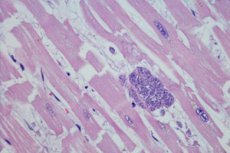New publications
New online test detects toxoplasmosis without the need for a blood test
Last reviewed: 03.08.2025

All iLive content is medically reviewed or fact checked to ensure as much factual accuracy as possible.
We have strict sourcing guidelines and only link to reputable media sites, academic research institutions and, whenever possible, medically peer reviewed studies. Note that the numbers in parentheses ([1], [2], etc.) are clickable links to these studies.
If you feel that any of our content is inaccurate, out-of-date, or otherwise questionable, please select it and press Ctrl + Enter.

An international team of researchers has developed a simple online test that can detect toxoplasmosis infection without a blood test, opening the way to a better understanding of how the common parasite affects human behaviour.
Dr Michele Garagnani from the University of Melbourne, Carlos Alos-Ferrer from Lancaster University and Anja Achtziger from Zeppelin University developed the test, which assesses a person's reaction time to determine whether they are infected with the protozoan parasite Toxoplasma gondii, which causes toxoplasmosis.
Until now, the only way to detect the infection was by testing blood or saliva.
“If you are RhD negative, then latent toxoplasmosis infection will slow your reaction time by less than a second, and although this difference is barely noticeable, it is enough for us to assess whether you are carrying this parasite,” said Dr. Garagnani.
The parasite is most often transmitted through cat feces or contaminated raw meat and affects about 30% of the world's population.
Toxoplasmosis does not pose an immediate danger to the average healthy person, and many can live their entire lives without ever knowing that they are carriers.
However, previous research suggests that in some people, toxoplasmosis infection may disrupt dopamine levels, reducing self-control and making them more impulsive, impatient and prone to risky decisions.
“Toxoplasmosis affects our neurochemistry by influencing the regulation of neurotransmitters such as dopamine, serotonin and adrenaline, which are also responsible for behavior, including fear,” said Dr. Garagnani.
"When we consider that 2.4 billion people worldwide are infected with toxoplasmosis, that's a very large portion of the global economy whose decisions are at least partly influenced by the parasite."
To confirm the reliability of the reaction time test as a diagnostic tool, the team conducted a clinical trial comparing the proposed test with a traditional blood test.
The researchers measured the reaction times of 79 Rh-negative participants, and the results showed that their new test was 97% accurate. The study was published in the journal Acta Psychologica.
"Our reaction time test detected toxoplasmosis infection in 11 of the 12 participants who had blood tests that confirmed the infection," Dr. Garagnani said.
The research team then recruited an additional 1,010 Rh-negative people who also completed the online reaction time test.
Based on the results, the team estimated that 18% of respondents were infected with toxoplasmosis.
All participants were then asked questions about their lives, including employment status and annual income.
"The survey results showed that respondents found to be infected with toxoplasmosis were 10% more likely to be unemployed and earned less on average than those found to be uninfected," Dr. Garagnani said.
"We also found that infected participants were more likely to smoke, drink alcohol, and experience mental health problems such as anxiety, stress, and depression than uninfected participants."
While this new online test does not replace a medical diagnosis, it does give researchers the ability to accurately measure the changes that toxoplasmosis infection can cause in a population.
"It is not practical or cost-effective to collect enough blood samples to study the behavioral effects of toxoplasmosis on a large scale," Dr. Garagnani said.
“While there is no known cure for toxoplasmosis, our new method gives the world a way to understand how many of us are infected, how it affects our behaviour and what steps we can take to manage the consequences.”
